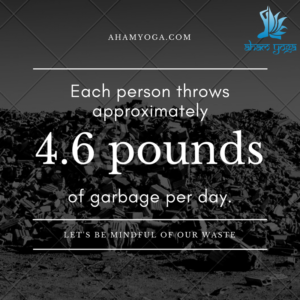According the Center of Sustainability at Duke University, the average person generates 4.6 pounds of waste per day.
With 55% ending up in one of 3500 landfills.
Are you aware of how much waste you generate per day? From your morning coffee to your afternoon takeaway lunch, and your evening grocery shopping? What about during spring cleaning, or when you decide to clean out your closet of old clothes and shoes? Out of sight, out of mind? It doesn’t exactly work that way. Being in the information age, we can no longer ignore the vast amount of information available at our fingertips, and learning to live sustainability is one crucial avenue towards a cleaner, brighter, and livable world for our future generations. It is our responsibility to digest, learn, and begin to introduce small changes that have the potential to show extreme positive changes in the way our future world looks. Here are 5 simple tips to help you live a more sustainable lifestyle.
Paper or plastic? Neither!
Plastic accounts for nearly 10% of the waste we generate. Try to carry your own reusable shopping bags when going to the local market or grocery store. Leave extra bags in your car so you don’t need to use the store’s plastic. And if you must, use paper and recycle mindfully. We all buy fruits and vegetables on a regular basis. Instead of reaching out to the nearest roll of plastic bags at your local grocer, invest a few dollars in buying re-usable vegetable or freezer bags. This small change on your part will go a long way in saving the Earth. It is right in the vegetable aisle in every market. If you do not see it, ask for it. And use paper bags if you cannot get your hands on the reusable bags.
Bring your own re-usable coffee cups and water bottles.
50% of the plastic waste we produce, we use just once and throw away. Bring your reusable coffee mug to the coffee shop to get your morning fix, and carry around a water bottle with you to refill throughout the day. The more mindful we become of how we live, the greater our connection to this planet will become. In this regard, the US seems to be the slowest to make environmentally friendly changes. India, despite its own issues, has banned the use of plastic in many cities. You now need to bring your own reusable bags and containers when you shop, buy food, go at a restaurant, or run any errand. If you show up without your own bags and boxes, you will be paying additional money for a reusable bag and boxes. Less than 1% of Sweden’s trash end up in landfills. If smaller, so-called less powerful nations can make these strides, we really need to wake up and stop living a life of excess.
Turn off the lights!
And unplug your electronics when you are not home, or especially when you leave for vacation. This will help conserve a good amount of energy. There are many additions that can easily make your home ‘smart’. You can now buy and self-install smart switches, temperature control, etc so you do not need to keep everything running all the time.
Shop smartly.
As creatures, we have gotten into a habit of accumulating. If you have lived here in the US your entire life, then you know the craziness that happens around Black Friday and the holiday season. With free return policies from leading brands and Amazon, we end up ordering whatever the heart desires and the wallet can handle. Only to return most of them in the weeks to come. This generates a lot of packing and waste material. While it is easy to say purchase only what you need, it is harder to practice it. The heart wants what the heart wants. Instead, opt for In-store pick up so you can make one trip to grab all that you want or need, and reduce your carbon footprint.
Adopt a more minimalist mentality.
In yoga, we are taught about Aparigraha – this literally means ‘non-hoarding’. This principle encourages us to live within our means. To not give into fear of not having enough or our desire to own multiples of the same thing. To remind ourselves that our possessions, by no means, define who we are. For example, buy one shirt, give one shirt away. Fast, cheap fashion is also causing a lot of problems in the world today. Clothes do not disintegrate easily and when they end up in landfills, they emit dangerous gasses affecting the health of people living nearby. But we do not realize this when we give into trends and yoga pants because most of the trash is usually shipped off to a third world country. Shop only for the clothes you need, and give away the ones that no longer fit or that you no longer want. But know that most shelters also have more than they can handle and often throw stuff away. Less clutter = more clarity, more savings.
Can you think of other helpful tips to living a more sustainable lifestyle? Share them in the comments below so our children can live in a brighter, cleaner world and future!


